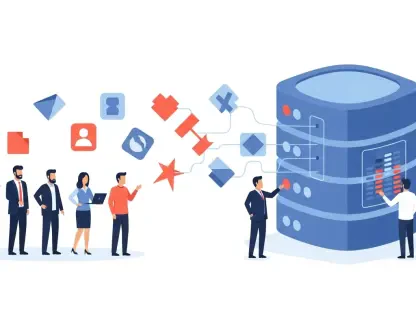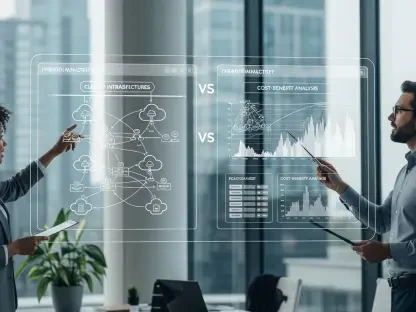In a rapidly evolving technological landscape, the integration of artificial intelligence (AI) and blockchain is transformative across multiple sectors. These revolutionary technologies, each with distinct capabilities, offer unprecedented potential when converged. This unique synergy fosters new levels of innovation, efficiency, and trust, essential in today’s complex data-driven environments. Industries, particularly healthcare and finance, benefit immensely as AI’s ability to analyze and learn from data combines with blockchain’s robust security framework. A deeper understanding of this integration reveals how these systems improve data management and decision-making, heralding a new era of digital advancement.
Understanding the Convergence of AI and Blockchain
AI and Cognitive Function Replication
AI stands at the forefront of technological advancements, mimicking human cognitive functions and transforming data processing. This technology empowers machines to emulate human thought processes, learning from vast data volumes, identifying patterns, and making informed decisions. AI’s remarkable capabilities extend across industries, enhancing problem-solving and operational efficiency. By enabling machines to learn and adapt, AI reduces the time and resources required for complex analyses, offering valuable insights into customer behavior, market trends, and operational efficiency.
AI’s application is diverse, ranging from customer service automation and fraud detection to complex scientific computations and predictive analytics. The use of AI in these areas streamlines processes, improves accuracy, and fosters innovation. As AI technology continues to evolve, its ability to mimic human cognition and create intelligent systems will redefine how industries operate, pushing the boundaries of what machines can achieve in various fields.
Blockchain Technology and Data Integrity
Blockchain technology organizes data in a decentralized and immutable manner, ensuring security and transparency in data management. This decentralized ledger structure allows data to be recorded across multiple nodes, preventing unauthorized alterations and ensuring data integrity. Blockchain’s encryption and immutability make it a powerful tool in industries that require robust data security measures and trustworthy transaction records.
As blockchain technology advances, it promises to redefine traditional data management practices, offering secure, reliable, and transparent solutions that can adapt to changing business needs. Its potential to enhance data integrity and security opens new possibilities for industries, paving the way for innovative applications and business models.
Enhancing Data Security
The Strength of Blockchain in Security
Blockchain’s decentralized architecture fundamentally changes how data is secured, offering unmatched integrity and reliability. Because data on a blockchain is stored across numerous nodes, it becomes virtually tamper-proof, as a consensus is required for any changes. This aspect creates a secure environment where data integrity is maintained without centralized oversight. As a result, it is particularly valuable in sectors where data sensitivity and security are paramount, acting as a trust layer that significantly diminishes fraud and misuse risks.
In sectors like finance and healthcare, blockchain technology not only secures transactions but also enhances regulatory compliance. The technology’s innate transparency ensures all stakeholders have access to the same trusted data, minimizing discrepancies and disputes. Additionally, the reliability of blockchain as an audit trail streamlines compliance processes, reducing associated costs and enabling institutions to focus resources on core business functions. This revolutionary technology thus creates a more secure and efficient operating environment across diverse industries.
Case Study: Healthcare Data Management
In healthcare, blockchain’s role is crucial in preserving the integrity and security of electronic health records (EHRs). Ensuring patient data’s security and privacy is a complex challenge, as these records are vulnerable to breaches and unauthorized access. By integrating blockchain into EHR systems, healthcare providers create secure, decentralized information repositories, effectively reducing data breach incidences. The decentralized nature of blockchain offers a tamper-proof environment for storing sensitive patient information, fostering trust between patients and healthcare providers.
Paired with AI, healthcare providers leverage patient data to improve healthcare delivery and patient outcomes. AI algorithms analyze data to predict health trends, personalize treatments, and optimize care delivery, all within the secure confines of blockchain. This combination empowers a patient-centric model where patients control their data, enhancing privacy and compliance with data protection regulations. The trust and transparency afforded by AI and blockchain integration promise more efficient and reliable healthcare systems, directly benefiting providers and patients.
AI-Driven Decision Making
Leveraging AI for Better Outcomes
AI’s ability to rapidly process and analyze extensive datasets revolutionizes decision-making across industries, leading to more accurate and timely outcomes. In healthcare, this capability translates into significant improvements in patient care, as AI-driven models predict disease progression and optimize treatment pathways. By leveraging AI, healthcare providers can base decisions on data-derived insights, enhancing patient outcomes and operational efficiency. AI’s role in decision-making extends beyond healthcare, benefiting sectors like finance, where data-driven strategies optimize risk assessment and investment decisions.
Beyond analysis, AI can anticipate trends and monitor complex systems for anomalies, alerting stakeholders to potential issues before they escalate. This proactive stance not only mitigates risks but also allows for strategic interventions that optimize performance and results. The reliance on AI for decision-making is poised to grow, as industries recognize the value of its predictions and insights in maintaining competitiveness and ensuring long-term success.
Real-Time Insights
The integration of AI with blockchain enables real-time clinical insights that enhance decision-making processes in healthcare settings. AI-powered analytics applied to blockchained data facilitate instant feedback and tailored patient treatments, reflecting the latest medical research and patient-specific data. These real-time insights are invaluable in clinical settings where timeliness directly impacts treatment effectiveness. By utilizing blockchain’s secure data framework, AI can ensure the data driving these insights is accurate and reliable.
Outside healthcare, the capability for real-time insights is transforming industries by enabling rapid response to changing conditions and emerging threats. Whether in supply chain management or financial services, timely data allows stakeholders to make informed decisions that align with current market or operational conditions. The ability to glean real-time insights from secure, verified data marks a transformative step forward, ensuring decisions are informed, timely, and in line with strategic objectives.
Integration Challenges and Future Prospects
Addressing Current Challenges
Despite the promising potential of AI and blockchain, their integration is not without challenges, chiefly concerning scalability and regulatory adherence. The complexity of combining these technologies often requires substantial resources and expertise, making it harder for smaller firms to adopt. Scalability remains a critical issue, as blockchain networks, though secure, require solutions that ensure they can handle large volumes of transactions without compromising speed or integrity. Additionally, meeting regulatory requirements demands compliance with global standards, necessitating the development of industry-wide protocols.
Solving these challenges involves collaborative efforts from industry leaders, policymakers, and technologists. Standardized protocols and frameworks can facilitate smoother integration, while cross-industry partnerships can drive innovation and share solutions. By addressing these issues, AI and blockchain technologies can be more widely adopted, enabling industries to harness their combined power effectively. This collaboration not only resolves current limitations but also paves the way for more comprehensive and integrated applications.
Future Applications
As AI and blockchain technologies develop, new applications emerge, offering potential solutions to longstanding industry challenges. Future prospects include decentralized AI marketplaces where algorithms and models can be securely exchanged, broadening access to AI’s benefits. These marketplaces could democratize AI usage, enabling even smaller businesses to leverage cutting-edge technology for strategic advantage. Blockchain also enhances business intelligence by ensuring the integrity of data used in AI-driven analytics, leading to more accurate and actionable insights.
Moreover, innovative applications in fields like supply chain management and smart contracts have the potential to transform operational models, increasing transparency and reducing inefficiencies. The continuous improvement of these technologies promises to drive transformative shifts within industries, optimizing processes, reducing costs, and ensuring greater alignment with regulatory and consumer demands. As AI and blockchain converge in more applications, the future points to a more interconnected, efficient, and transparent business environment.
Expert Opinions and Industry Trends
Pioneering New Business Models
As AI and blockchain technologies reach maturity, they pave the way for more efficient systems and groundbreaking business models. These models prioritize transparency, security, and efficiency, aligned with the growing demand for ethical and secure data handling. Experts anticipate a significant shift in how businesses operate, focusing on integrating these technologies to address evolving consumer and regulatory demands. This trend is evident in the creation of platforms that leverage AI and blockchain for enhanced customer experience and streamlined operations.
Organizations such as the World Economic Forum highlight potential benefits, such as cost savings through reduced fraud and improved efficiencies. The insights provided by these technologies empower businesses to innovate and adapt to the challenges of a fast-paced digital landscape. Industry experts stress that continuous development and collaboration remain essential for fully harnessing the potential benefits of AI and blockchain integration, urging businesses to adopt these technologies actively.
Continued Development and Collaboration
The path forward for maximizing the benefits of AI and blockchain lies in sustained innovation and collaborative efforts. Innovations in these fields drive technological advancements, offering new possibilities for businesses willing to embrace them. Collaborative efforts between industry participants are critical in tackling challenges like standardization, regulation, and technical integration. These partnerships catalyze shared learning and development, setting global standards that facilitate widespread adoption.
By fostering a culture of collaboration and continuous improvement, industries can fully realize the transformative benefits of AI and blockchain. These efforts will ensure these technologies are not only used optimally but also benefit a wider array of sectors, contributing to societal advancement. The momentum of AI and blockchain innovation promises a future where industries are more interconnected, secure, and efficient, leading to improved outcomes for businesses and consumers alike.
The Transformative Potential Realized
In today’s fast-paced technological world, integrating artificial intelligence (AI) with blockchain is creating transformative impacts across various industries. These two groundbreaking technologies, each with its distinct features and capabilities, promise extraordinary possibilities when they are combined. The convergence of AI and blockchain is fostering new levels of innovation by enhancing efficiency and building trust, crucial elements in our increasingly complex, data-driven landscape. Particularly, sectors like healthcare and finance are reaping substantial benefits. AI’s advanced ability to analyze and learn from vast amounts of data is synergized with blockchain’s exceptional security and transparency framework. This powerful collaboration not only strengthens data management and decision-making processes but also addresses some of the most pressing challenges in digital systems today. As organizations look to innovate and improve, understanding how AI and blockchain interact is essential. They offer a new layer of reliability and intelligence to digital operations, signaling a significant leap forward in the digital era. The potential applications and improvements in efficiency they bring are ushering in an exciting new age of digital transformation, where data is not just smarter but also extremely secure.









